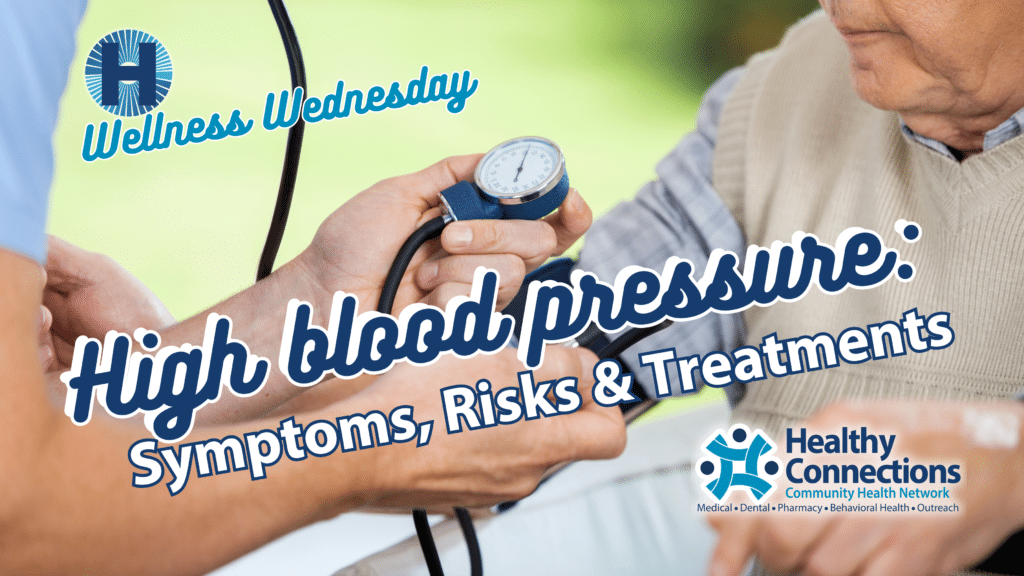High blood pressure, or hypertension, is often called the “silent killer” because it can develop unnoticed for years, quietly damaging the body before symptoms appear. Left untreated, hypertension significantly increases the risk of heart disease, stroke, kidney failure, and vision loss. However, with early detection and proper management, you can take control of your blood pressure and protect your heart.
At Healthy Connections, our board-certified providers specialize in hypertension care, offering advanced screenings and personalized treatment plans to help you maintain a healthy lifestyle.
What is High Blood Pressure?
Blood pressure is the force of blood pushing against artery walls. It is measured in millimeters of mercury (mmHg) and recorded as two numbers:
✅ Systolic pressure (top number) – The pressure when the heart beats.
✅ Diastolic pressure (bottom number) – The pressure when the heart is at rest between beats.
Blood Pressure Categories
| Category | Systolic (mmHg) | Diastolic (mmHg) |
|---|---|---|
| Normal | Below 120 | Below 80 |
| Elevated | 120-129 | Below 80 |
| Stage 1 Hypertension | 130-139 | 80-89 |
| Stage 2 Hypertension | 140+ | 90+ |
| Hypertensive Crisis | 180+ | 120+ |
🚨 If your blood pressure is consistently 130/80 mmHg or higher, you should seek medical advice.
Early Warning Signs of High Blood Pressure
Although hypertension often has no symptoms, some people experience:
- Frequent headaches – A persistent or pounding headache may indicate rising blood pressure.
- Dizziness or blurred vision – Reduced blood flow to the brain can cause vision issues and balance problems.
- Chest discomfort – Increased pressure on the heart may lead to tightness or pain.
- Shortness of breath – Your heart may struggle to pump efficiently, affecting oxygen levels.
- Fatigue or confusion – Poor circulation can impact cognitive function and energy levels.
👩⚕️ If you experience any of these symptoms, schedule a check-up immediately!
The Dangers of Uncontrolled Hypertension
Ignoring high blood pressure can lead to:
❌ Heart disease – Hypertension forces the heart to work harder, increasing the risk of heart attacks and heart failure.
❌ Stroke – High blood pressure damages arteries, making them more likely to rupture or become blocked.
❌ Kidney disease – The kidneys rely on healthy blood flow; high blood pressure can lead to kidney failure.
❌ Vision loss – Hypertension can damage blood vessels in the eyes, leading to permanent vision problems.
💡 The good news? High blood pressure is preventable and manageable.
How to Lower Blood Pressure Naturally – Best High Blood Pressure Treatment Options
Even if you’ve been diagnosed with hypertension, there are lifestyle changes that can help:
✔ Eat a heart-healthy diet – Choose low-sodium, high-fiber foods like fruits, vegetables, and whole grains.
✔ Exercise regularly – Aim for at least 30 minutes of moderate activity (walking, swimming, cycling) most days.
✔ Maintain a healthy weight – Shedding extra pounds can lower blood pressure naturally.
✔ Limit alcohol and caffeine – Both can increase blood pressure if consumed in excess.
✔ Reduce stress – Practicing deep breathing, yoga, or mindfulness can lower blood pressure levels.
✔ Monitor your blood pressure at home – Track your numbers to stay informed about your health.
🔹 Did You Know? Losing just 10 pounds can significantly reduce blood pressure!
How Healthy Connections Can Help – Top Hypertension Treatment Near You
At Healthy Connections, we offer:
✅ Comprehensive hypertension screenings
✅ Personalized treatment plans
✅ Heart health education
✅ Medication management
✅ Lifestyle coaching for better blood pressure control
📍 Find a Clinic Near You: We have locations in Hot Springs, Mena, Malvern, Sheridan, Russellville, Texarkana, and more!
Frequently Asked Questions (FAQs)
What are the early signs of high blood pressure?
Most people have no symptoms, but headaches, dizziness, blurred vision, and chest discomfort can sometimes occur.
How often should I check my blood pressure?
Adults should check their blood pressure at least once a year, or more frequently if they have a history of hypertension.
Can high blood pressure be reversed?
While it cannot always be reversed, lifestyle changes and medications can effectively control it.
Is hypertension genetic?
Yes, family history plays a role, but lifestyle choices significantly impact your risk.
Schedule Your Blood Pressure Check Today!
Early detection saves lives. Don’t wait until it’s too late!
📞 Call us: 888-710-8220
🌐 Visit: healthy-connections.org
Healthy Connections is here to help you take charge of your heart health and live a longer, healthier life. Book your appointment today!











